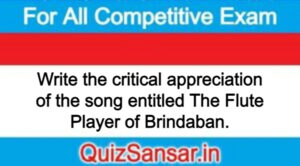
Write the critical appreciation of the song entitled The Flute Player of Brindaban.
Write the critical appreciation of the song entitled The Flute Player of Brindaban.
Ans.
Introduction
The poem entitled The Flute Player of Brindaban is a direct reference to Lord Krishna. It takes the form of a song of a devotee of Lord Krishna who is enchanted by the magic spell of divine flute. In the context of Hindu belief, a devotee of Krishna could be Radha or the gopis: but in the poem, the devotee appears to be the poetess herself, who will follow her divine lover, giving up the ‘earthly loves’ and ‘worldly enticements’. The poetess has firm belief that to be one with God, one should avoid being worldly and materialistic. The poet moves from spiritual yearning to the realization that fulfilment lies in answering the magical flute call of the flute.
Thought-Content
Krishna’s beloved (here the poetess) who has been enticed by the sweet and haunting music of his matchless flute, will follow her divine lover forsaking the earthly lures and attractions. Following the magical flute she will go to Indra’s kingdom where golden flowers bloom the year round and streams of limited water forever flow to the dark and dismal kingdom of Yama, the God of Death. Undaunted by perils of the deep oceans, high mountains, fear of time unconquered space or light untraveled route, she will follow her lover through thick and thin.
Moral of the poem
True love is born of the marriage of true minds that admits no impediments and ultimately culminates in the complete identification of the lover and the beloved. The spell of love is so irresistible that the beloved is not satiated until she follows her lover, and ultimately attains complete identification with him. The poetess has explored love as a potent force, and depicted the music of flute as everlasting willingness to strive to meet her lover and follow him wherever he goes. True love is spiritual and demands sacrifice:
“Still must I like a homeless bird
Wader, forsaking all
The earthly loves and wordly lures
That held my life in thrall,
And follow, follow, answering
Thy magical flute call.”
Use of References
The flute player of Brindaban is related to Lord Krishna who encaptured the hearts of gopis, so goes the legend, by the mellifluous tune of his flute and led them to divine ecstasies of union of the soul with the cosmic soul. There is a reference of Kadamba, a large, lushgreen tree with spreading branches and orange-coloured fragrant blossoms. It is believed in Hindu mythology that Lord Krishna used to play the flute under this tree. These trees are still found in plenty in the forests around Brindaban and Mathura. Golden flowering groves is the reference of the garden of Lord Indra, probably Nandana in the upper world. According to Puranas, there was enmity between Indra and Krishna. When Krishna went to Swarga (Heaven) to carry off the Parijat tree, a fight ensued, in which Krishna was victorious, and he went off with the tree.
Form, Meter, Style and Language
The poem is a beautiful love lyric. The stanzas are in iambic meter of four feet and three feet alternately. The handling is quite admirable in this poem resulting in a musical lyric. The language of this lyric is simple and musical. It lacks in that embellishment which is the cardinal feature of most of her poems, yet it is remarkable for its flawless and apt diction. It is full of highly expressive epithets as “matchless flute”, “lampless woe”, “winged foot”, “time unconquered space” and “light untraveled route”.
-
Write the critical appreciation of the poem No. 12 entitled Far Below Flowed.
-
Write the critical appreciation of the poem No. 11 entitled Leave this Chanting.






